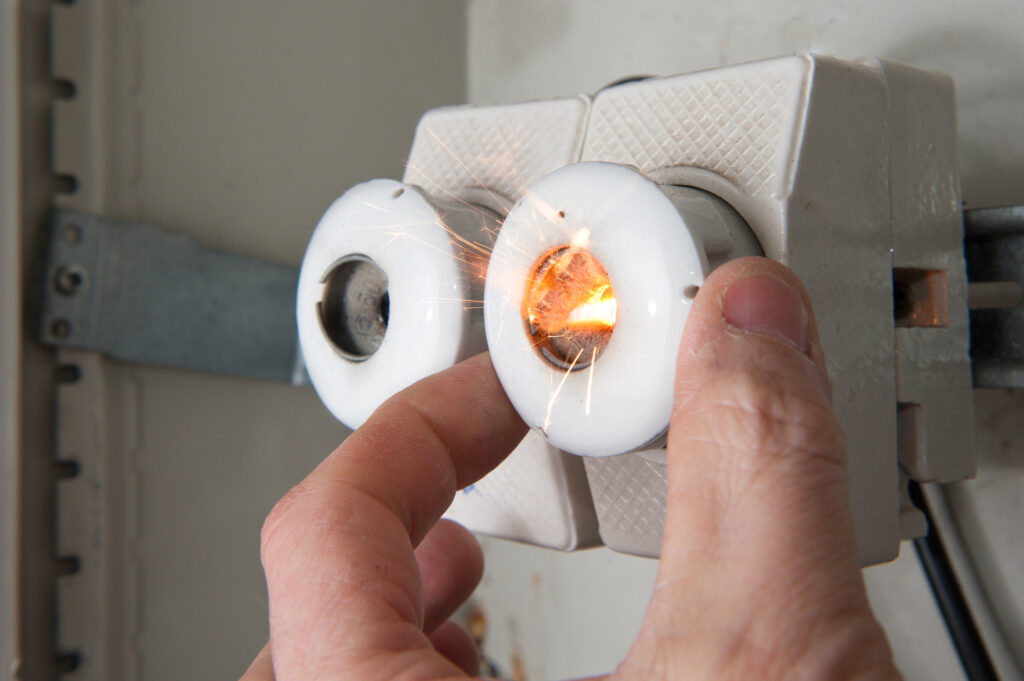
An employee plugs in the coffee maker and receives a shock. A construction worker cuts into a wall, slices a wire, and receives a serious burn. The head nurse at an old hospital turns on a light and is electrocuted due to old wiring. Accidents like these–and other similar work injuries caused by electric shock–do happen in the workplace. All too often, they cause both minor and major complications in the victim’s life.
Complications after electric shock may affect you both physically, emotionally, and financially. An electrical injury may even result in long term disability and death. So, can you sue for electric shock at work in Nevada? Nevada workers’ comp law makes it a bit complicated.
Our attorneys are here to help make it less complicated for you. If you have suffered a case of electric shock or subsequent injury while at work, contact a Las Vegas electric shock attorney at Lerner and Rowe Injury Attorneys. We are familiar with all the intricacies of Nevada workers’ comp law, and are ready to help you and your family. Call (702) 877-1500 for a completely free consultation today.
Can I Sue for Electric Shock at Work in Nevada?
Due to Nevada workers’ comp law, you cannot sue for electric shock at work like you might sue for another’s negligence. However, you can file a workers’ compensation claim. This is due to the Nevada Industrial Insurance Act (NRS Chapters 616A-D), and exclusive remedy law.
These state that as long as an employer has purchased workers’ compensation insurance, their employees cannot sue. Instead, employees are covered by the company’s workers’ compensation benefits. While these benefits are much easier to come by (versus a full personal injury lawsuit), these benefits usually only cover medical bills, lost wages, and little else.
A few other scenarios may affect your case. If you are an independent contractor, it’s likely that you are not covered by any company’s worker’s comp insurance. In addition, the electrical injury may have been caused by a third party–that is, a party other than the employer or employee.
If you believe that you have not received the worker’s compensation owed to you, or that you may in fact have a more complex legal issue on your hands, reach out to a Las Vegas personal injury lawyer at Lerner and Rowe Injury Attorneys. We will look into your case, and see how we can help you receive full compensation.
Electric Shock Injuries and Electrocution Fatalities
As a worker, you may wonder what kinds of electrical injuries are more likely to happen in the workplace? Before we answer that question, however, it is important to first understand the difference between an electric shock and electrocution.
Types of Electric Shock Injuries
Electric shock injuries are often more minor in comparison to other more serious catastrophic work-related injuries. That being said, these types of injuries can still cause notable harm that requires time for recovery and healing.
For example, an electric shock injury may result in:
- First degree burns on the top layer of skin
- Second and third degree burns, in the first and second layers of skin
- Third degree burns, where all skin layers, including the tissue underneath, are affected
- Fourth degree burns, into the muscle, ligaments, nerves, and bones
- Confusion
- Difficulty breathing
- Heart issues, like arrhythmias and cardiac arrest
- Seizures
- Traumatic brain injury (TBI)
- Muscle pain
- Hearing loss
On the other hand, if a victim were to fall in reaction to being shocked by electricity they could also hit the ground or come in contact with other hard or sharp objects. If this occurs, these injuries can become extensive and include spinal cord injury, broken bones, lacerations, and internal bleeding.
Electrocution Fatalities
Electrocution is derived from the word combination of “electro” and “execution.” Meaning that a person who is electrocuted has either died from an electric shock or has been severely injured.
According to Electrical Safety Foundation International (ESFI), eight percent of all electrical injuries were fatal in 2019. These fatalities numbered over 165, which demonstrated a 3.75% increase from the previous year.
Serious injury and fatality from electric shock can reap a mountain of medical bills, as well as cause a life-altering loss of household wages. If you, or a loved one, has suffered from electric shock or electrocution at work, reach out to the workers’ compensation lawyers at Lerner and Rowe Injury Attorneys. Our team is dedicated to helping injury victims learn more about any legal recourse they may be entitled to.
Common Causes of Electric Shock at Work

ESFI also states that the most fatalities (43%) happened to be lost in the construction and extraction occupations, where employees commonly work with wiring in sometimes unstable conditions. Other high risk occupations for electric shock are construction, firefighters, medical staff, and maintenance workers.
Here are a few more common causes of electric shock.
- Equipment may cause electric shock if it is broken or otherwise improperly maintained.
- Installation of wiring or other electrical equipment may cause shock, if it was not completed correctly.
- The general work environment may be the cause of electric shock, if wires are left out, water is let in, or another electricity conductor is ignored.
- Work practices may cause electric shock, if employees were not trained well (or at all).
- Downed power lines, especially after a storm, can cause someone to be electrocuted simply by entering the water.
- Shock may occur if old wiring is not brought up to code.
- A bypass of safety features, either done by builders or management, may lead to an electrical injury.
- Defective products may also cause electric shock at work.
Above all, negligence and/or recklessness may be the ultimate cause of electric shock injury. These are familiar concepts when it comes to personal injury lawsuits. However, even if your injury was your employer’s fault, you may only be able to file for workers’ compensation in Nevada.
How to Prevent Electric Shock at Work
Any employee should feel safe at work. Unfortunately, not all employees do. If you have concerns about your current workplace, you may file a complaint to the Occupational Safety and Health Administration (OSHA) about your unsafe work conditions. They will look into the situation at your workplace, and follow up with your supervisors to make sure proper safety protocols are in place.
You can also work to prevent electric shock at work by staying vigilant in your own practice. Follow your training, and stay alert to all conditions throughout your day. Keep an eye out for your fellow workers as well. Finally, report any broken equipment or maintenance needs to your supervisor as soon as you notice them. This way, you can help prevent electric shock injuries and electrocutions from occurring in the future.
Seek Out an Electric Shock Attorney in Las Vegas
The most valuable non-legal service we offer is to carry the emotional burden of our clients, and that’s especially true with electrical injury in the workplace. Let us handle the stress instead, while you focus on recovery.
Call (702) 877-1500 today for a free consultation if you need to file a workers’ compensation claim due to an electric shock injury, or if a loved one who was electrocuted at work. You can also connect with a legal representative 24/7 through LiveChat. Or, fill out this online form.



